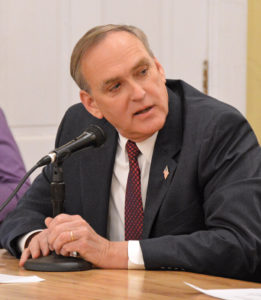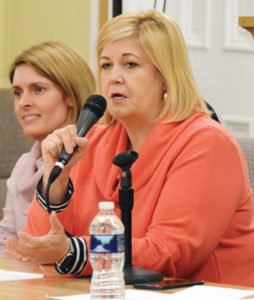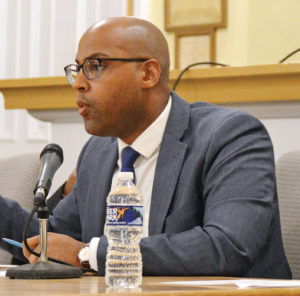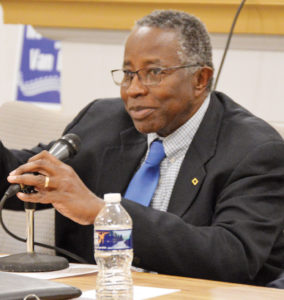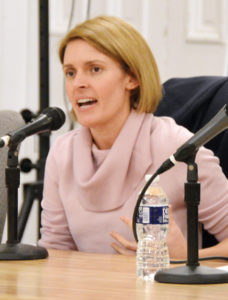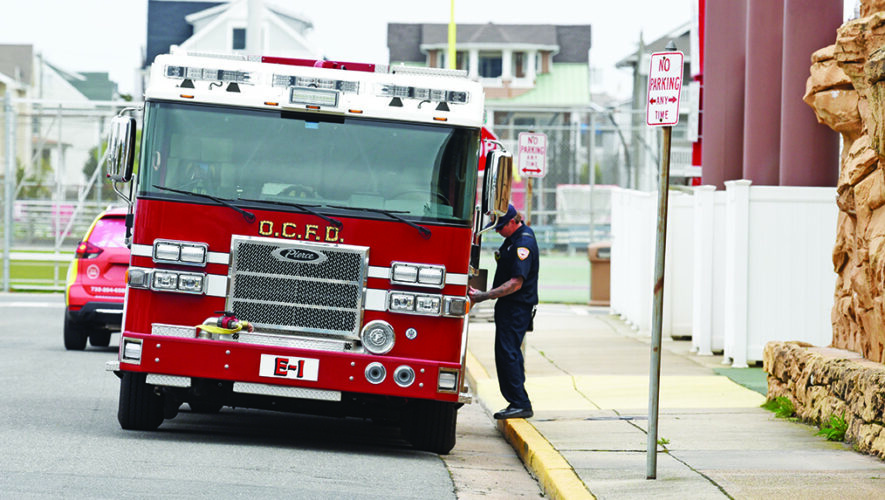CAPE MAY COURT HOUSE – There was more agreement than sparring as Democratic candidates for the Second Congressional District outlined their positions at a public forum last week.
The Middle Township Democratic Club sponsored the March 4 candidate’s forum held at the Old Cape May Court House.
Candidates answered questions from moderators Jim Quinn, Lenora Boninfante and Carol Sabo for two hours on topics ranging from the economy, the environment, tourism and their presumptive Republican opponent, Congressman Jeff Van Drew.
Van Drew was elected to Congress in 2018 as a Democrat, but switched parties and became a Republican last December. In media interviews Van Drew said his opposition to the impeachment of President Donald Trump and the pressure he received from a local Democratic chairman to vote for impeachment, was the reason for his party switch.
Democratic leaders in the district called Van Drew a traitor and vowed to reclaim the seat in November.
Candidates at the forum included Brigantine resident Robert Turkavage, a former FBI agent; Amy Kennedy, also of Brigantine and a former teacher; Longport resident Brigid Callahan Harrison, a political science professor; Dr. John Francis, an environmentalist and West Cape May commissioner; and Will Cunningham, chief investigator of the House Oversight Committee and Vineland resident. Candidate Ashley Bennett, an Atlantic County freeholder, has dropped out of the race.
Cunningham said it was important for Democrats to acknowledge Van Drew’s “betrayal” to their party.
“This man represented us for 15 years in Trenton before he ever set foot in D.C.,” Cunningham said. “I overcame a lot of hardship in Cumberland County. Poorest county in the state with the highest teenage birth rate. I am a product of those statistics, but I’m also a reflection of this region’s potential.”
After witnessing the aftermath of a two-tanker collision in San Francisco Bay, Francis vowed never to ride in an automobile and began walking regularly. He earned three college degrees including a Ph.D. in land management sand wrote legislation on oil spill management for the U.S. Coast Guard.
“I know how to listen to people, people with different ideas. I think it’s a skill that I have and I’d like to take that to Congress and be your representative,” Francis said.
Harrison taught political science and law at Montclair State University for the past two decades and is a frequent commentator and provides political analysis to news outlets.
“This race is about the future of our country, because that’s what Van Drew put it out to be. This was a mandate. I also think in our district what we have seen is a lack of representation for the better part of 25 years,” Harrison said. “Overall we’ve experienced an incredible period of neglect. I hope through strong leadership I will be the person to change that.”
Kennedy is the wife of former Congressman Patrick Kennedy (D-RI). She is the educational director of The Kennedy Forum, and spent more than a decade working in New Jersey and Pennsylvania public schools. She was born in Atlantic City and grew up in Pleasantville and Absecon.
“My whole family is still in this area and I hope that’s the opportunity that we can expect for our children, that they too can stay in this area because it’s viable as a place to live, that we put the infrastructure in place to protect it and that there’s enough opportunity here so they can stay and work and earn a living and raise their own families,” Kennedy said. “What we want to move away from is the hatred and the divisiveness that we’ve seen so far.”
Turkavage switched parties from Republican to Democrat last December.
While with the FBI, Turkavage handled fugitive, bank robbery and fraud investigations. He served as a supervisory special agent of both the Public Corruption and Government Fraud squads in New York City. He worked at JP Morgan Chase & Co. as its security department’s vice president.
“In Washington, D.C. every interest group has a lobbyist, whether it’s banking, the defense industry, everybody. Everybody but our kids. You look at the world our children are entering and it’s not a pretty sight. That’s why I’m running,” Turkavage said.
Environment
Asked how they’d address environmental issues such as global warming and climate change and preserve the district’s environment, Francis commended Gov. Phil Murphy on protecting state waters from oil drilling, but added that oil companies can still drill outside of state waters.
“What I’ve discovered about the environment is that it’s about how we treat each other because how we treat each other is going to manifest in the physical environment,” Francis said. “The environment has to deal with human rights and civil rights and gender equality and economic equity. I will be looking through that lens to address any policy issues that comes before me.”
Kennedy said by addressing environmental issues quickly, investments could be made in developing “clean technology.”
“I think it’s crucial to our area that we not only address the climate crisis but that we embrace it and make it part of our identity here. I believe there’s an opportunity for ecotourism, that we have a lot to offer in our community and if we partner with unions we’re able to build infrastructure to support that and to create green jobs to help our area,” Kennedy said.
Turkavage said he opposes drilling for oil off New Jersey’s coasts, and drilling in Arctic and Alaskan protected lands. He also said he supports the Paris Agreement, which addresses climate change by challenging countries to reduce their climate-altering pollution.
“Addressing climate change specifically, the current administration has really reversed a lot of policies of the Obama Administration. They reversed the auto-emission standards that the Obama Administration put in place a few years ago. That’s very important because the carbon dioxide is one of the main greenhouse gasses that’s affecting our climate,” Turkavage said.
Cunningham said that while the U.S. Army Corps of Engineers has a strategy for climate risk management, finding funding for implementation has stalled.
“The Army Corps of Engineers is asking for $10 billion in funding for their projects. We know that will save $1.7 billion of damage annually. It pays for itself in seven years. We just have to get an initial investment in the door to make actual change happen. We see the government know exactly what needs to be done and no action is taken,” Cunningham said. “Why do we wait for crises to occur before we take action when we have plans we can implement now?”
Economy and jobs
Harrison said the district lacks resources for infrastructure improvements to its roads, tunnels, bridges and back bays.
“One of the things that I would really fight for is increased funding for both New Jersey transit to extend 66 miles of rail line down through south Jersey but also invest in things like a ferry from Bayonne where there’s a ferry terminal down to Cape May where there’s also a ferry terminal. These kinds of things could make our communities be more like bedroom communities where people live, shop and also frequent businesses,” Harrison said.
Kennedy said there should be trade school and student loan forgiveness, which would make the district a hub for research and science jobs. She said the Federal Aviation Administration’s Technical Center in Egg Harbor Township and drone testing conducted at the Cape May County Airport are examples of the district’s economic potential.
“There are things that we can be doing within our community to scale up and to train our community members so that the jobs that become available are ready for the taking,” Kennedy said.
Turkavage said a lack of infrastructure and remedial education opportunities are prevalent in Cape May County. He said improving educational standards and infrastructure would attract corporations into the area.
“If you take care of those basic issues first, the jobs will follow. As a congressman I’m going to be alert to make sure that funding wherever it is – the Department of Transportation, the Department of Education – is going to be a top priority of mine seeing that we get the share of funding that we in district deserve,” Turkavage said.
Cunningham said trade school education and free community college would improve overall education and the economy.
“Those folks get educated here, they stay local and they contribute to our economy. We increase the minimum wage and we’ll also have apprenticeships,” Cunningham said, adding that businesses should be incentivized to hire younger people. “We need someone exposed to the fact that if you work hard and stay true to your purpose you’re going to have results in the end.”
Francis said improving the transportation system would help people without automobiles.
“There’s just a lot of issues that are dependent upon how people are moved around and get around,” Francis said.
Abortion
On the subject of abortion, Turkavage said he is “pro-life” and “against abortion in most situations.” He added that he also opposes the death penalty and favors stricter gun laws.
“It’s my opinion and I don’t try to pontificate. That is just my personal opinion. I believe that life should only be taken to preserve other life,” Turkavage said.
Cunningham said he was “solidly pro-choice.”
“When we talk about bodily autonomy, when we talk about women’s equality, until women are truly equal, none of us are truly equal,” Cunningham said. “We know the potential of the Equal Rights Amendment… This is a historic struggle.”
Francis said he supported equal pay for equal work and that both men and women should be treated equally.
“I don’t know any man who has to get permission to have any medical procedure,” Francis said. “Why should women?”
Harrison said she’s pro-choice and said states should not eliminate abortion access because the Supreme Court, in Roe v. Wade, ruled the Constitution protects a woman’s freedom to choose to have an abortion without burdensome government restrictions.
“When we’re talking about the issue of reproductive justice we need to recognize that throughout the United States, while Roe vs. Wade is still the law of land in practice, it is not the law of the land when you get out to some of the midwestern states where someone may have to go through a process that requires them to travel out of state to have an abortion,” Harrison said. “Even if you are a woman who has been the victim of rape or incest or some other form of sexual violence, you’re being forced to go through a process that’s absolutely unfair.”
Kennedy said a majority of citizens are pro-choice and support reproductive freedom, but the issues that were formerly decided like Roe v. Wade are still being challenged.
“They are not thinking towards the future,” Kennedy said. “We’re considering health care now and how to expand health care and we’re still going back and trying to overturn Roe v. Wade that for many Americans that this is progress…. When we continue to move back, we’re setting back our whole gender.”
Universal health care
Cunningham said universal health care should “absolutely be a right.”
“We are dealing with a propaganda machine on the other side of the aisle that will stop at nothing to terrify folks away from change that we know is badly needed to keep folks healthy,” Cunningham said, and added that the secretary of Health and Human Services should be allowed to negotiate prescription drug prices. Current federal law prohibits this negotiation.
“It’s not socialist to negotiate; it’s high capitalism. Apparently, the best negotiator in the world is in the White House,” hea said.
Francis said he also supports universal health care, and added the Affordable Care Act, commonly called Obamacare, was “one step closer” to universal health care.
“We just can’t snap our fingers and have it. I think there are a lot of steps that are going to have to be taken to have it,” Francis said.
Harrison said health care is a human right and supported universal health care. She said it will be paid for through tax increases.
“I believe that we need a sunset provision that allows labor unions and employees to negotiate with their employers. I know that if tomorrow we had universal health care that my compensation in salary wouldn’t increase,” Harrison said. “We need to give the corporate structure a bit of time so that employees can say to their employers, ‘We’re going to have increased taxes, you’re going to have reduced costs, we need to have some compensation to help offset that tax increase.”
Kennedy pointed out that some people are paying for their health costs through online donations like gofundme.com, which she called “unacceptable.”
“When I’m a congresswoman I would like to be focused on prevention. Prevention is what we see when we change our health system,” Kennedy said. “It’s a fight worth taking on.”
Turkavage said he is not a proponent for Medicare for all and noted that millions of Americans are “happy with their current health insurance plans.”
“I do believe the United States government should be negotiating with drug manufacturers. Those very expensive drugs for which there is no generic brand. These are the drugs that are costing our taxpayers tremendous amounts of money out of their pocket,” Turkavage said.
Homelessness
On how he would help the homeless, Francis said West Cape May “started a conversation” to give residents a $500 Visa card a month to residents based on income, which was patterned after a program in Stockton, Calif.
“I’d look at how we can not only increase minimum wage but how also we can help those people who are not working at all, finding the rise in their happiness,” Francis said. “I think it’s going to require some more money from that wall you are building.”
Harrison said a disproportionate number of veterans comprise the homeless population. She said PTSD (post-traumatic stress disorder) or mental health issues compel them to live on the streets. She said there are people who are also homeless because their houses have been foreclosed.
“In our district we have the highest foreclosure rate in the entire United States,” Harrison said, adding increasing the minimum wage to $15 per hour would allow people to “support their families with dignity.”
Kennedy agreed with increasing the minimum wage and that mental health can be a challenge with homelessness as well as substance abuse.
“We need things like supportive housing and supportive employment. It is not enough to give people treatment, therapy or 28-day recovery and … expect them to be better,” Kennedy said.
Turkavage said causes of homelessness could be financial, related to drug usage or mental health, or veterans returning home.
“We need a good living wage for our wage earners out there that is indexed to inflation,” Turkavage said. “Mental health is one of the leading causes for the homelessness that we see. We should employ all resources that are necessary to combat mental health issues.”
Cunningham said the issue was personal for him because he experienced homelessness growing up.
“This has to be our urgent mission. There are pockets of this across our district,” Cunningham said. “In providing services, we really have to meet people where they are.”
Gun control
The candidates opposed “Second Amendment Sanctuary” resolutions which prevent the enforcement of certain gun control laws perceived as violating the Second Amendment. Freeholder boards in Cape May and Atlantic counties passed “Second Amendment Sanctuary” resolutions.
On the subject of gun control, Harrison said the National Rifle Association (NRA), the country’s largest gun lobby, “has hijacked our national agenda.”
“I’m the wife of a retired cop. There are guns in my home. They are in a safe and I believe that every person who owns a gun should go through the same process that my husband has to go through. He has to be trained, he has to have a rigorous background check and a psychological exam. These are the kinds of policies that 79 percent of Americans agree with,” Harrison said.
Kennedy advocated for the removal of money and lobbying influences over politics, which she said would pave the way for gun control legislation.
“There are solutions that we can come to once the money is out of this issue. We can all move forward on universal background checks, on waiting periods, on laws for extreme risk or red flag laws. Those are things that need to happen because we’re seeing the greatest number of deaths are by suicide. This would be an approach not just for gun violence but also for mental health,” Kennedy said.
Turkavage said “Second Amendment Sanctuaries” are “total nonsense.”
“We do need a background check for every weapon purchased. There should be no time limitation for the time needed to conduct a background check,” Turkavage said. “Red flag laws are laws that are designed to alert the court or law enforcement when an individual is perceived as a threat to others or themselves…. No weapon of war should be available for purchase.”
Cunningham said gun control is a “pivotal issue” and said the amendments in the Constitution are not unlimited. He supported overturning the Dickey Amendment, named after Congressman Jay Dickey of Arkansas, which mandated that the Centers for Disease Control could not research gun violence or advocate for gun control.
Francis said he also supports removing monetary influence from the political process.
“Universal background checks should be really stringent and red flag laws should be really stringent,” Francis said.


